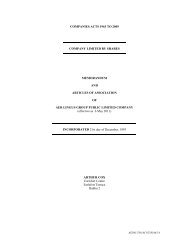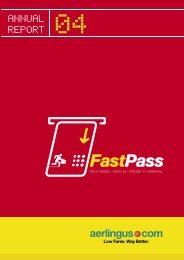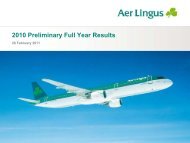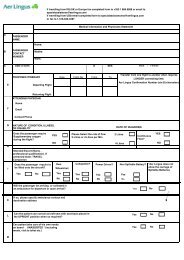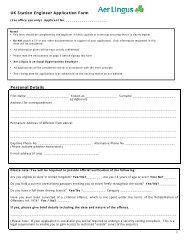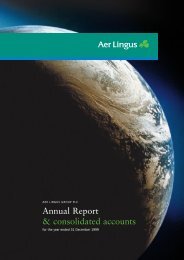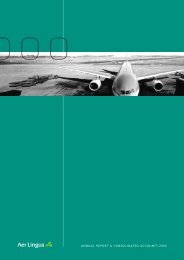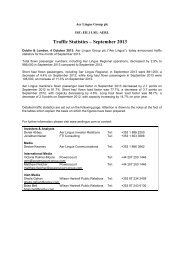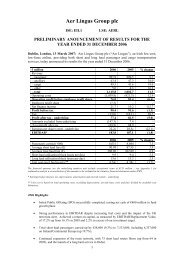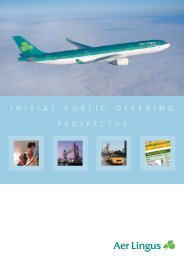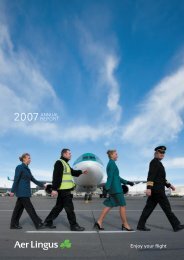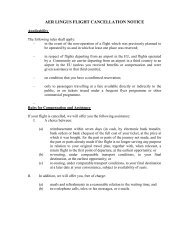annual report 2009 - Aer Lingus
annual report 2009 - Aer Lingus
annual report 2009 - Aer Lingus
Create successful ePaper yourself
Turn your PDF publications into a flip-book with our unique Google optimized e-Paper software.
Corporate Social Responsibility Statement <strong>Aer</strong> <strong>Lingus</strong> Group Plc – Annual Report <strong>2009</strong>13Corporate Social Responsibility StatementEnvironmentClimate change is a global issue and isthe primary environmental challengeof this century. Increased levels ofgreenhouse gases such as carbon dioxideact to enhance the natural greenhouseeffect and accelerate irreversible changesin the climate. <strong>Aer</strong> <strong>Lingus</strong> acknowledgesthat its operations have an impact on theenvironment. Balancing the protectionof the environment with people’s needto travel is essential for both ethical andbusiness reasons.Controlling fuel consumption is alsoa business priority. In <strong>2009</strong>, fuel costsrepresented 26% of the Group’s totaloperating costs. However, it is importantto note that aviation is a relatively smallcontributor to climate change. TheUnited Nations Intergovernmental Panelon Climate Change (IPCC) states that,globally, aviation contributes to only 2-3%of the world’s CO 2emissions. Accordingto the Association of European Airlines,European aviation accounts for 0.5% of thistotal. While aviation has an environmentaleffect, the airline industry as a whole is takinga great many practical measures to limitemissions. The challenge for <strong>Aer</strong> <strong>Lingus</strong>is to balance the needs of the businesswith the need to improve environmentalperformance.Airlines are heavily regulated and subjectto audit in certain jurisdictions in relationto environmental matters. <strong>Aer</strong> <strong>Lingus</strong> hasbeen, and intends to continue to be, fullycompliant with all applicable regulations.<strong>Aer</strong> <strong>Lingus</strong> also takes every opportunity todrive cost efficiencies across the networkand to prevent pollution. To this end,<strong>Aer</strong> <strong>Lingus</strong> is a member of the AirportEnvironmental Committee at our homebase in Dublin Airport.The Group continues to researchand implement new strategies andprogrammes to reduce its environmentalimpact – including aircraft and enginecondition monitoring and maintenance,waste management, and, most importantly,continued investment in new technologiesand new aircraft. <strong>Aer</strong> <strong>Lingus</strong>’ fuel efficiencyhas improved significantly in the last 20years, with the average fuel consumptionper available passenger kilometre reducingby 52% since 1991. This in turn reduces theemissions per available passenger kilometer.Emissions trading is one of the economicinstruments that can be used to addressclimate change. The ETS is one of themechanisms whereby the EU seeks to meetits emission reduction targets. The directiverequires all flights both intra EU and intoand out of EU airspace to participate ina carbon cap-and-trade scheme.The Aviation Directive (Directive 2008/101/EC amending Directive 2003/87/EC so as toinclude aviation activities in the scheme forgreenhouse gas emission allowance tradingwithin the Community) came into forceon 2 February <strong>2009</strong>. The Irish EnvironmentalProtection Agency (EPA) has been appointedthe Competent Authority (Regulator) for theimplementation of the Directive in Ireland.The Minister for the Environment, Heritage& Local Government issued the EuropeanCommunities (Greenhouse Gas EmissionsTrading) (Aviation) Regulations <strong>2009</strong> in July<strong>2009</strong>, which transposed key features of theAviation Directive into National Legislation.In August <strong>2009</strong> <strong>Aer</strong> <strong>Lingus</strong> was required tosubmit monitoring plans for emissions to theEnvironmental Protection Agency includinga first Monitoring Plan for Tonne-Km Data(TKD) and another for Annual Emissions.Inclusion of aviation activity in the EUETS requires <strong>Aer</strong> <strong>Lingus</strong> to account for itsgreenhouse gas emissions over a given year.At the end of that year, <strong>Aer</strong> <strong>Lingus</strong> musthave enough CO 2allowances (credits) forthe fuel burned on flights to, from and withinEU countries in the year.<strong>Aer</strong> <strong>Lingus</strong> has three sources of allowances toaccount for its carbon emitted: free allocationallowances, allowances purchased on theopen market and carbon offset credits.



